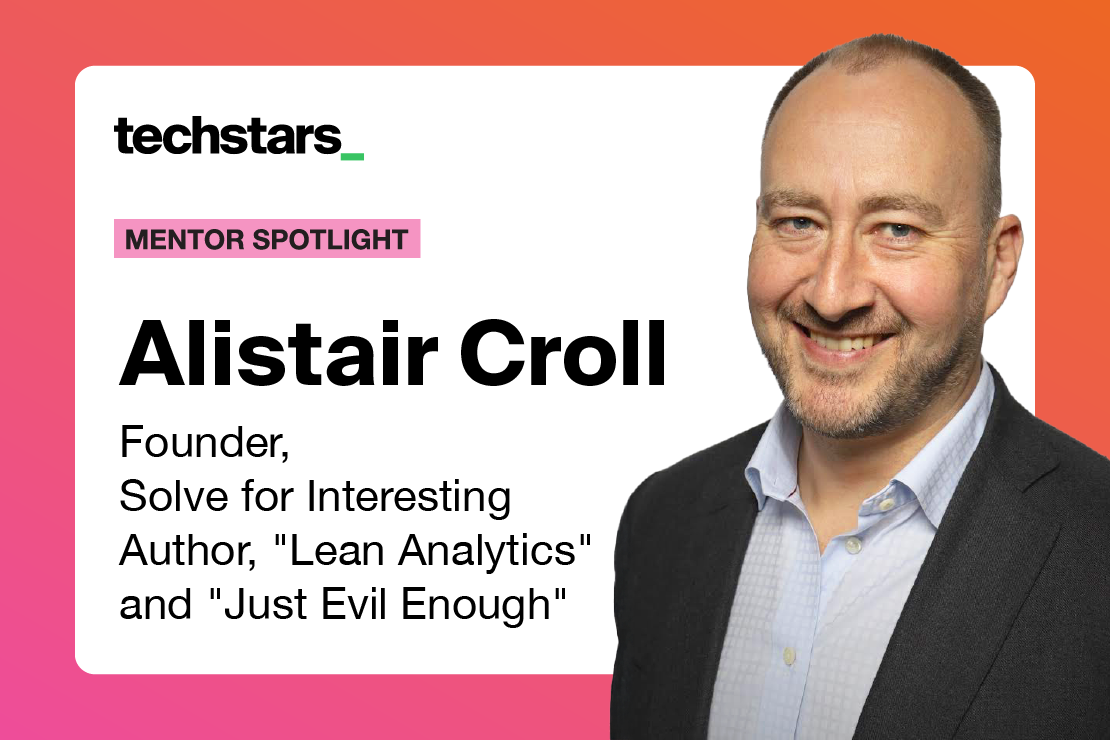Techstars Mentor Alistair Croll: "Your Startup Must Be a Disagreement With the Status Quo"
Dec 16, 2024

After an early career in product management and telecommunications at Eicon, Primary Access, and 3Com, Alistair Croll built web performance pioneer Coradiant and sold it to BMC for $135M. He launched the Year One Labs incubator, chaired O'Reilly's Strata and UBM's Cloud Connect, founded FWD50, and has taught at Stanford and Harvard Business School. He has co-written three books including "Lean Analytics," widely considered required reading for startups. His latest book, "Just Evil Enough," looks at subversiveness in business and will be available in early 2025.
Why are you a mentor with Techstars?
Three big reasons.
First, a founder must be somewhat delusional to believe in their vision where others don’t. That means startups aren’t honest with themselves. That’s why Ben Yoskovitz and I wrote "Lean Analytics," which fundamentally changed how new ventures use data.
Second, founders over-index on product features and leave go-to-market strategy as an afterthought. That’s why Emily Ross and I wrote "Just Evil Enough," to teach them how to create attention they can turn into profitable demand.
Third, we won’t fix the problems of today within the systems that created them. Startups are a disagreement with the status quo, and I want to help change happen.
And of course, it’s fun to work with smart people and hear their ideas.
What advice do you find yourself giving most often to founders?
If it won’t change your behavior, it’s a bad metric.
Investors back you because you can change the behavior of a lucrative target metric.
Your startup must be a disagreement with the status quo.
People don’t realize they can Just Do Things. Carefully chosen activity is the antidote to uncertainty.
What impact do you hope to make with the founders you mentor?
Better, smarter, more successful startups that focus on behavioral change. Less “soft tech” apps we don’t need, and more founders who have big visions of how to improve society. And a pragmatism about what it takes to move from founder to master operator.
What's your favorite moment or memory from mentoring that stands out to you?
Several times, about 30 minutes into a conversation, the founder has grabbed a piece of paper or whiteboard and asked me to shut up for five minutes. Those breakthrough moments where they’re reconsidering their value chain, the way they charge for their product, or their go-to-market strategy, are magical.
What trends or innovations are you most excited about?
The second-order consequences of generative AI, specifically things like shadow developers and consumption-based pricing. The application of LLMs to government modernization. Widespread consumer diagnostics. Elder tech and the ability for technology to extend lifespan and human dignity. Deep tech solutions to climate change and pollution.
How do you encourage startups to stay innovative and adaptable in a rapidly changing market?
It’s a balance. It’s easy to get focused on new shiny things and never deliver. But if you lock yourself away, you calcify. Getting out of the building, using the tool (and your competitors) yourself, and drawing out your product lifecycle regularly are good tactics.
Most of all, you need to first have principles you adhere to really strongly, but be flexible in how you apply them.
What advice do you have for other mentors?
Your first hour is the most valuable because that’s when you have “child’s mind.” Notice where you’re confused or ask for additional information.
Remember that everything sounds easy from afar, but reality has a surprising amount of detail.
Wrap up your session with no more than three tasks, defined by clear metrics you can revisit later.
Above all, have empathy. Read the room. Check in with how they’re doing as a leader, an operator, and an inventor — because a successful startup takes all three.
